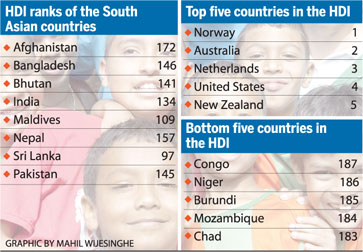|
UN Report stresses:
Sustainability and equality, the key to development
by Gamini WARUSHAMANA
Sri Lanka is at the turning point of development and needs a
concerted effort and discussion by all stakeholders to ensure equity and
sustainability in development, said UN Country Director in Sri Lanka
Subinay Nandy at the launch of the UN Human Development Report 2011 in
Colombo last week.
 The Report was globally launched in the Danish capital, Copenhagen
recently. The countrywise launch of the Report has been organised to
stress the importance of sustainability and equity at national level. The Report was globally launched in the Danish capital, Copenhagen
recently. The countrywise launch of the Report has been organised to
stress the importance of sustainability and equity at national level.
Environment Minister Anura Priyadarshana Yapa also participated, Dr.
Dhilini Gunawardena of the University of Peradeniya and Dr. Saman
Kelegama of IPS gave presentations on equality and economic development
aspects of human development in Sri Lanka.
Expansion of freedom
The Report said that environmental degradation intensifies inequality
through adverse impacts on already disadvantaged people. Human
development is defined in the Report as 'expansion of people's freedom
and capabilities to lead lives that they value and have reason to value.
It is about expanding their choices'. Freedom and capabilities are a
more expansive notion than basic needs. Disadvantaged people are a
central focus of human development and this includes those who will
suffer the most severe consequences of risks arising from our activities
today. Sustainable human development is the expansion of the substantive
freedom of people today while making reasonable efforts to avoid
seriously compromising the future generation, the Report said.
According to the Report widespread environmental degradation around
the world and potential future degradation will occur by 2050. The
global Human Development Index (HDI) which is at 0.682 in 2011 would be
eight percent lower than the baseline that captures the adverse effects
of global warming on agricultural production, access to clean water and
improved sanitation and pollution. This will be 12 percent lower in
Sub-Saharan Africa and South Asia. Under a more adverse environment
disaster scenario, the global HDI would be 15 percent below the
projected baseline.
The Report points out that disadvantaged people who are suffering the
most from repercussions of environmental deterioration, contribute
little to the problem. The Report has made a comparison of Carbon
Dioxide emission between countries. The average person in a developed
country with a high HDI accounts for over 30 times the Carbon Dioxide
emission of a person in a low FDI country.
Environmental degradation
Countries with higher incomes generally have higher Carbon Dioxide
emission per capita. However, there is no association between emission
and health and education components of HDI. There is a strong positive
correlation between Carbon Dioxide emission and income.
Global temperature now averages 075 C higher than at the beginning of
the 20th century and the rate of change has accelerated due to human
activities such as burning fossil fuel, cutting forests and
manufacturing cement which increase Carbon Dioxide emission. Climate
change has an adverse impact, such as reduction of rainfall, rising sea
level and disaster risks. Low HDI countries are affected more due to the
drop in rainfall. Rainfall in low HDI countries dropped by 4.16 mm,
medium HDI countries by 2.89 mm, by 0.07 mm in high HDI countries and
-1.49 mm in very high HDI countries. Since 1870, average sea level has
risen by 20 cm and the rate of change has accelerated and if the rate
continues sea level will rise by 31 cm.
 This issue will affect coastal regions. A half metre sea level rise
by 2050 would flood almost a million square Km, or an area the size of
France and Italy combined and affect over 170 million people, the Report
said. This issue will affect coastal regions. A half metre sea level rise
by 2050 would flood almost a million square Km, or an area the size of
France and Italy combined and affect over 170 million people, the Report
said.
The most disadvantaged people carry a double burden of deprivation;
more vulnerable to the wider effects of environmental degradation, they
must also cope with threats to the immediate environment posed by indoor
air pollution, dirty water and unimproved sanitation.
According to the report, 10 percent increase in the number of people
affected by an extreme weather event reduces a country's HDI almost by
two percent, with larger effects on incomes in medium HDI countries.
Although energy is central to human development, 1.5 billion people
(or one in five) worldwide lack electricity.
Among the multidimensional poor, deprivation is much higher and only
one in three have access to electricity. Global energy supply reached to
a tipping point in 2010, with renewable energy accounting for 25 percent
of global power capacity and delivering more than 18 percent of global
electricity.
The challenge is expanding access at a scale and speed that the
quality of lives of the people will improve in the future.
The Report stresses that a clean and safe environment is a right and
not a privilege. Embedding environment rights in national constitutions
and legislation can be effective.
The Report raises the question of financing the cost of environment
conservation and improve the HDI of vulnerable people. Although
investments needed are large, they do not exceed current spending on
other sectors such as defence. The estimated annual spending to achieve
universal access to modern sources of energy is less than an eighth of
the annual subsidies for fossil fuels. To close the funding gap, the
Report reiterates its proposal presented in the 1994 HD report, the
currency transaction tax.
The recent financial crisis has revived interest in the proposal,
underscoring its relevance and timeliness. Since foreign exchange
settlement infrastructure is more organised, centralised and
standardising and implementing such tax is more feasible.
|

